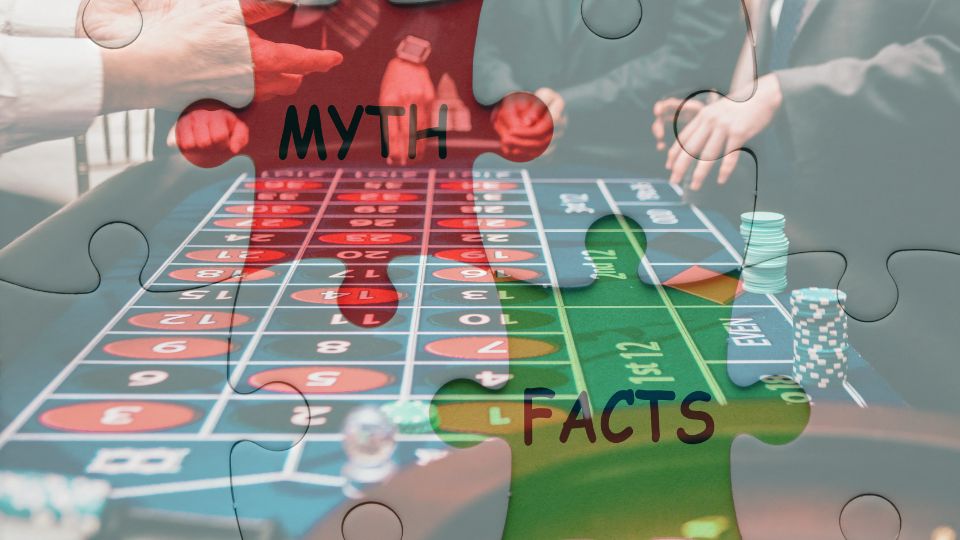Drinking alcohol while gambling improves your chances of winning.
The myth suggests that drinking alcohol can improve your chances of winning, but this is not true. Why do you think that the alcohol in casinos often is so inexpensive? Since when, did we do anything better with alcohol in our blood?
Fact: To drink alcohol while gambling can impair your judgment and lead to risky behavior. Alcohol does not improve your chances of winning. It makes gamblers that higher risk (bet higher), and gamble longer – Alcohol makes you more likely to lose, and lose more money.
All gamblers participate in illegal activity.
This myth implies that all gamblers engage in criminal behavior, which is false. In most countries, gambling is legal.
Fact: Only a small minority of gamblers engage in criminal activity related to gambling. Most gambling is legal and regulated. One problem in the gambling industry is that criminals use casinos for money laundering. As a result, each casino has a department or people working to prevent money laundering.
Previous outcomes influence the rounds on a slot machine.
This myth suggests that previous rounds impact the outcome of one round on a slot machine, but this is not true. Each round on a slot machine is independent and has no bearing on future rounds. The industry wants you to believe that different play rounds are related. The idea of “ casino lurkers” is something the industry has promoted through movies. Check out the fun scene with Phoebe in Friends below. We also discuss how the gambling industry wishes this myth were true in the following article.
Fact: Each round on a slot machine is a random event, and previous outcomes have no impact on future rounds.
Compulsive gambling isn’t a problem if you have the money for it.
This myth implies that compulsive gambling isn’t a problem if you can afford it. It’s not true! Compulsive gambling can have serious consequences regardless of an individual’s financial situation.
Fact: Compulsive gambling can lead to financial ruin, relationship problems, and other negative consequences regardless of an individual’s financial means. Read more about this in our article about symptoms of gambling addiction.
Sticking to a budget means your gambling is always safe.
The myth suggests that your gambling behavior is safe if you have a budget and stick to it. However, this is not true, as safe gambling behavior involves more than just budgeting. The gambling industry promotes the myth through talks about safer and responsible gambling, and responsible play prevents gambling harm.
Fact: Safe gambling behavior involves setting limits, being aware of the risks, and seeking help if you have a problem.
Understanding a game can boost your chances of winning.
The myth implies that the better you master a game, the higher your chances of winning. While understanding a game can help you make informed decisions, gambling outcomes are still based on chance.
Fact: Knowing the rules of a game can help you make better decisions, but gambling outcomes are still based on random chance. If you know how the game works, playing it might be more fun because you understand what happens.
Casino bonuses can increase your chances of winning.
This myth suggests that casino bonuses can improve your chances of winning, but this is not true. Bonuses offer more opportunities to play, but they do not increase your odds of winning.
Fact: Casino bonuses can provide more opportunities to play, but they do not increase your chances of winning. Instead, they are used by casinos to keep you playing longer. They lock players in by adding turnover requirements to the bonus and deposit money. The chances of being able to withdraw your money are lower with a bonus than without a casino bonus.
Financial issues are the primary cause of problem gamblers’ relationship breakdowns.
The myth implies that financial problems are the leading cause of relationship breakdowns among problem gamblers. While financial problems may be a factor, gambling addiction can negatively impact relationships.
Fact: Problem gambling can lead to trust issues, emotional distance, and other relationship problems beyond just financial difficulties.
Gambling is not a substance addiction and, therefore, not a real addiction.
The myth suggests that because gambling addiction is not based on a substance, it is not a real addiction. However, gambling addiction is a recognized disorder that can have serious consequences.
Fact: Gambling addiction can have severe emotional, psychological, and social consequences, that are similar to those of substance addiction.
Problem gamblers seek gambling opportunities everywhere.
This myth suggests that problem gamblers constantly seek gambling opportunities, but this is not true. Problem gambling can take many forms and levels of severity.
Fact: Not all problem gamblers gamble on every opportunity or form of gambling. Some gambling addicts are only playing on one game. There are varying degrees of severity of the gambling disorder.
Parents are responsible for children’s problem gambling.
This myth implies that parents are to blame for their children’s gambling problem, which is unfair and untrue. Gambling addiction is a complex issue with many factors.
Fact: Blaming parents for their adult children’s problem gambling ignores the nature of addiction and the variety of factors that contribute to it. Although, traumas from childhood can play a part in how likely a person is to develop a gambling addiction in the future. However, every person is responsible for one’s behavior and, blame can not be placed on another person.
Believing you’re lucky means, you’ll win more often.
This myth suggests that believing in luck increases your chances of winning, but this is not true. Gambling outcomes are based on chance, not personal beliefs or superstitions.
Fact: Believing in luck does not impact gambling outcomes, which are determined by random chance. Feeling lucky might feel good, but it doesn’t mean you’re more likely to win.
There is no cure for problem gambling.
This myth suggests that problem gambling cannot be treated, which is not true. Various treatments are available to help problem gamblers overcome their addiction.
Fact: There are various treatments for problem gambling, including therapy, self-help groups, and online gambling support.
Some slot machines are “hot” or “cold”.
This myth implies that some slot machines are more likely to pay out than others, but this is not true. Each round on a slot machine is a random event, and a random number generator determines the outcome.
Fact: Each round on a slot machine is a random event, and there is no way to predict which machines are more likely to pay out. However, games have different ways of paying out. Some games give many small wins, while others with high volatility only provide a few big wins. The slots will pay the same total value if the RTP (Return to player) is the same.
Gambling only leads to financial issues.
This myth suggests that gambling addiction only leads to financial difficulties, but this is not true. Problem gambling can lead to many negative consequences, including emotional, psychological, and social problems.
Fact: Problem gambling can lead to various negative consequences beyond just financial issues, including relationship breakdowns, depression, and anxiety. Lack of sleep and neglect of physical activity can also have severe health consequences. Many compulsive gamblers suffer from poor self-esteem and self-confidence as a result of their gambling.
A family member’s problem gambling does not harm children.
The myth suggests that a family member’s gambling problem does not affect children. Problem gambling can significantly impact children’s emotional and psychological well-being.
Fact: Children of problem gamblers are at a higher risk of developing mental health issues, such as anxiety and depression, and may experience family conflict and financial instability. Another aspect is that, if gambling is part of a persons life from an early age, they might use it to escape the pain they feel. Hence they risk becoming addicted to gambling as well.
Gambling is not addictive.
This myth suggests that gambling addiction is not a real disorder, but this is not true. Gambling addiction is a recognized disorder with specific diagnostic criteria.
Fact: Gambling addiction is a real disorder with specific diagnostic criteria and can have serious consequences. Gambling is designed to be addictive. The more dopamine the games can produce, the more likely the person can use gambling to escape.
Continuously playing will eventually result in a big win.
This myth suggests that if you keep playing, you will eventually win, but this is not true. Gambling outcomes are based on chance, and winning is not guaranteed.
Fact: Continuously playing does not increase your chances of winning, as gambling outcomes are based on random chance. Statistics show that the longer you play, the smaller the chance is that you have more money when you stop than when you started.
There are strategies to win consistently at slots/roulette/blackjack.
It suggests ways to win at gambling games consistently, but this is not true. Gambling outcomes are based on chance and cannot be predicted or influenced.
Fact: There is no tactic to win at luck-based games over time, as outcomes are based on random chance. We have seen “respected newspapers” publish articles on strategies to win on blackjack and even on slots, but these are full of lies and false assumptions. Don’t let them trick you!
Dealers manipulate the game if you’re winning too much.
It suggests that dealers will cheat if you win too much, which is false. Dealers are trained professionals who follow strict rules and regulations.
Fact: Dealers are trained professionals who follow strict rules and regulations, and cheating is not tolerated in reputable casinos. The dealers know you will lose any winnings if you continue playing their games, so they don’t need to try to cheat. On top of that, dealers have no personal incentive to cheat since they have hourly wages. The wages aren’t based on if you win or lose.
Gambling is an easy way to earn money.
Many think gambling is an easy way to make money. But gambling outcomes are based on chance and cannot be predicted or influenced.
Fact: Gambling is not a reliable way to make money, as outcomes are based on random chance and the odds always favor the house. The odds are never on your side, so the longer you play, the more you lose. The games are developed that way. Therefore, gambling is a terrible way to make money.
Casinos increase the oxygen level in the air to keep you playing longer.
This myth suggests that casinos pump in extra oxygen to keep players awake and playing longer, which is laughable. Casinos are not allowed to alter the air quality in their establishments.
Fact: Casinos are not permitted to alter the air quality in their establishments, and the idea of pumping in extra oxygen is a myth. If anything, most casinos in the US allow players to smoke inside the casinos. The reason is simple, most compulsive gamblers are also smokers. If they weren’t allowed to smoke in the casino, they would have to take smoking breaks, increasing the “risk” (from casinos’ perspective) that they stop gambling.
 English
English Español
Español Français
Français Português
Português Svenska
Svenska

